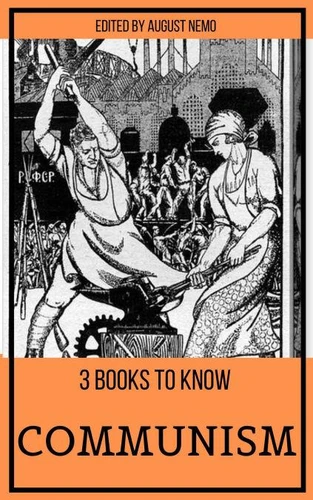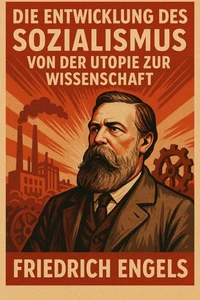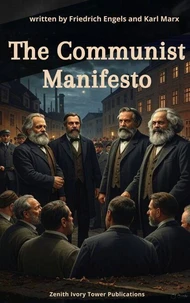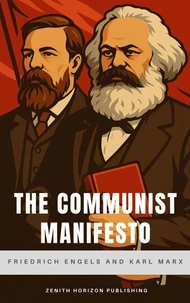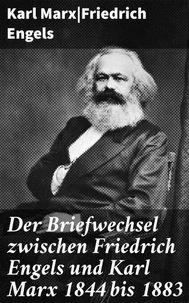3 books to know Communism
Par : , , ,Formats :
Disponible dans votre compte client Decitre ou Furet du Nord dès validation de votre commande. Le format ePub est :
- Compatible avec une lecture sur My Vivlio (smartphone, tablette, ordinateur)
- Compatible avec une lecture sur liseuses Vivlio
- Pour les liseuses autres que Vivlio, vous devez utiliser le logiciel Adobe Digital Edition. Non compatible avec la lecture sur les liseuses Kindle, Remarkable et Sony
 , qui est-ce ?
, qui est-ce ?Notre partenaire de plateforme de lecture numérique où vous retrouverez l'ensemble de vos ebooks gratuitement
Pour en savoir plus sur nos ebooks, consultez notre aide en ligne ici
- Nombre de pages686
- FormatePub
- ISBN978-3-96661-715-4
- EAN9783966617154
- Date de parution15/04/2020
- Protection num.Digital Watermarking
- Taille463 Ko
- Infos supplémentairesepub
- ÉditeurLibrorium Editions
Résumé
Welcome to the3 Books To Knowseries, our idea is to help readers learn about fascinating topics through three essential and relevant books.
These carefully selected works can be fiction, non-fiction, historical documents or even biographies.
We will always select for you three great works to instigate your mind, this time the topic is:Communism
Communism is a political and socio-economic ideology that seeks the establishment of an egalitarian society.
Its purpose is a society without social classes and stateless, through the common ownership of the means of production. Few political and economic theories were so influential in world history. The Manifest of the Communist Party was written by Karl Marx during the great process of urban struggles of the Revolutions of 1848. It criticizes the capitalist mode of production and the type of society generated by it.
Is a basic work for understanding the purpose and principles of scientific socialism. A century earlier, the philosopher Jean Jacques Rousseau was interested in the origins of human inequality. In Discourse on the origin and basis of inequality among men, Rousseau argues that man has deviated from his natural state of freedom to please individualistic desires. In Socialism: utopian and scientific, Friedrich Engels explains the differences between utopian socialism and scientific socialism.
Through a materialist perspective of history he understands communism as a natural substitute for capitalism. This is one of many books in the series 3 Books To Know. If you liked this book, look for the other titles in the series, we are sure you will like some of the topics.
Its purpose is a society without social classes and stateless, through the common ownership of the means of production. Few political and economic theories were so influential in world history. The Manifest of the Communist Party was written by Karl Marx during the great process of urban struggles of the Revolutions of 1848. It criticizes the capitalist mode of production and the type of society generated by it.
Is a basic work for understanding the purpose and principles of scientific socialism. A century earlier, the philosopher Jean Jacques Rousseau was interested in the origins of human inequality. In Discourse on the origin and basis of inequality among men, Rousseau argues that man has deviated from his natural state of freedom to please individualistic desires. In Socialism: utopian and scientific, Friedrich Engels explains the differences between utopian socialism and scientific socialism.
Through a materialist perspective of history he understands communism as a natural substitute for capitalism. This is one of many books in the series 3 Books To Know. If you liked this book, look for the other titles in the series, we are sure you will like some of the topics.
Welcome to the3 Books To Knowseries, our idea is to help readers learn about fascinating topics through three essential and relevant books.
These carefully selected works can be fiction, non-fiction, historical documents or even biographies.
We will always select for you three great works to instigate your mind, this time the topic is:Communism
Communism is a political and socio-economic ideology that seeks the establishment of an egalitarian society.
Its purpose is a society without social classes and stateless, through the common ownership of the means of production. Few political and economic theories were so influential in world history. The Manifest of the Communist Party was written by Karl Marx during the great process of urban struggles of the Revolutions of 1848. It criticizes the capitalist mode of production and the type of society generated by it.
Is a basic work for understanding the purpose and principles of scientific socialism. A century earlier, the philosopher Jean Jacques Rousseau was interested in the origins of human inequality. In Discourse on the origin and basis of inequality among men, Rousseau argues that man has deviated from his natural state of freedom to please individualistic desires. In Socialism: utopian and scientific, Friedrich Engels explains the differences between utopian socialism and scientific socialism.
Through a materialist perspective of history he understands communism as a natural substitute for capitalism. This is one of many books in the series 3 Books To Know. If you liked this book, look for the other titles in the series, we are sure you will like some of the topics.
Its purpose is a society without social classes and stateless, through the common ownership of the means of production. Few political and economic theories were so influential in world history. The Manifest of the Communist Party was written by Karl Marx during the great process of urban struggles of the Revolutions of 1848. It criticizes the capitalist mode of production and the type of society generated by it.
Is a basic work for understanding the purpose and principles of scientific socialism. A century earlier, the philosopher Jean Jacques Rousseau was interested in the origins of human inequality. In Discourse on the origin and basis of inequality among men, Rousseau argues that man has deviated from his natural state of freedom to please individualistic desires. In Socialism: utopian and scientific, Friedrich Engels explains the differences between utopian socialism and scientific socialism.
Through a materialist perspective of history he understands communism as a natural substitute for capitalism. This is one of many books in the series 3 Books To Know. If you liked this book, look for the other titles in the series, we are sure you will like some of the topics.

